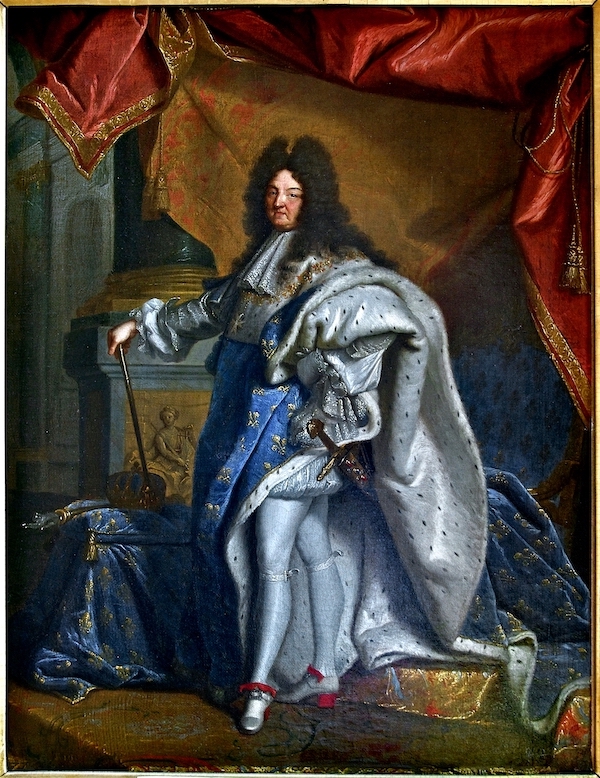The Rationalist Papers (16): L’état, c’est moi.

The president serves the government and the nation. When the president exploits the functions of government for political aims, we must toss him out.
Just a reminder: these Rationalist Papers posts are for the group I call the deciders: conservative, moderate, undecided, and third-party voters considering their choices in the 2020 US Presidential election.
In the early 18th Century, King Louis XIV of France reigned at the height of the excesses of the French monarchy. His exploitation of the monarchy to aggrandize and enrich himself was legendary. And he was reputed to have said, “L’état, c’est moi.” (In case you’re not a French speaker, the pronunciation is, roughly, “lay-tah, say mwah” — it rhymes.)
What does it mean? L’état translates literally as “the state,” meaning the government or the nation. “C’est moi” means “it’s me.” The meaning is that there is no distinction between the nation and the king — Louis is declaring that what he is, the nation is.
Louis XIV died after reigning for 72 years. But perhaps you remember what happened to his descendant Louis XVI, who lost his head at the guillotine in the aftermath of the French Revolution. L’état, c’est moi turned out to be unpopular with his subjects.
In the US, politics and government have always been distinct . . . until now
The President has a job, which is to manage the executive branch of the US government. In a re-election campaign, the President is also a candidate. Candidates engage in campaigns. The campaign is supposed to be distinct from the job of governing.
We have to be realistic. Electoral politics is a central part of all activity of elected officials and their administration. There is a reason that laws get passed at specific times in a president’s term, and that the president’s activities and statements sound different during the electoral process. But by law and custom, candidates for re-election are supposed to draw a distinction between official government activities and campaign activities.
The Hatch Act, passed in 1939, is a central part of the legal framework that maintains this distinction. The Hatch act prohibits Federal employee, including White House staff and members of Congress, from engaging in political activities while on duty, in a Government room or building, while wearing an official uniform, or while using a Government vehicle. Under the Hatch Act, “political activity” is defined as any activity directed toward the success or failure of a political party, candidate for partisan political office, or partisan political group.
The Hatch Act is the reason, for example, that Senators and Representatives must go to a different building outside of the Capitol to do fundraising. It is illegal to do fundraising while in Capitol Building.
Government officials in the Trump administration regularly violate the Hatch Act, making political statements regarding Trump, his opponents, and his re-election in their capacity as White House staffers. There is no prosecution, however, because the body in charge of enforcement is inactive in the Trump administration. As Trump’s chief of staff Mark Meadows put it, “nobody outside of the Beltway really cares” about ethics violations.
The Trump administration has arguably violated not just norms, but laws, by using the White House and the Washington Monument as backdrops for campaign events including the Republican National Convention. The administration’s argument is that the White House lawn is not part of the official building used for governing. But regardless of whether there is an actual violation of the law, it is certainly jarring to see the props of government — The White House, Air Force One, the Washington Monument — used as campaign backdrops. Are those campaign events or government events? It’s certainly hard to see the difference.
For me, the blurring of the Trump’s personal actions and his governmental role crossed a line when Attorney General William Barr’s Department of Justice agreed to aid in Trump’s defense in a defamation lawsuit brought by the writer E. Jean Carroll, who claims that Trump assaulted her in the 1990s. It is not the job of the attorney general to defend the president from rape accusations, which were obviously not governmental functions — especially since the events in question happened long before Trump was President.
Barr justified his choice to defend the president by saying this: “Officials who are elected and answer press questions while they’re in office, even if those questions relate to their personal activity, and could bear upon their personal fitness, is in fact in the course of federal employment.” It’s hard to see how this justifies using government lawyers to squash a defamation lawsuit about a rape.
Past presidents have gone to great lengths to keep a distinction between the President as a candidate and the President as part of government. No more.
You can almost hear President Trump saying “L’état, c’est moi,” (or whatever the equivalent is in his version of American English). But in America, the state, the candidate, and the person running for re-election are not the same. Campaigning and governing are different, and we need to keep them separate.
The alternative is for the incumbent president to turn the awesome powers and resources of government to his own re-election. I’m not ready to go there for any candidate, regardless of party. And any president who does go there deserves to be tossed out and have, not his neck, but his term cut short.